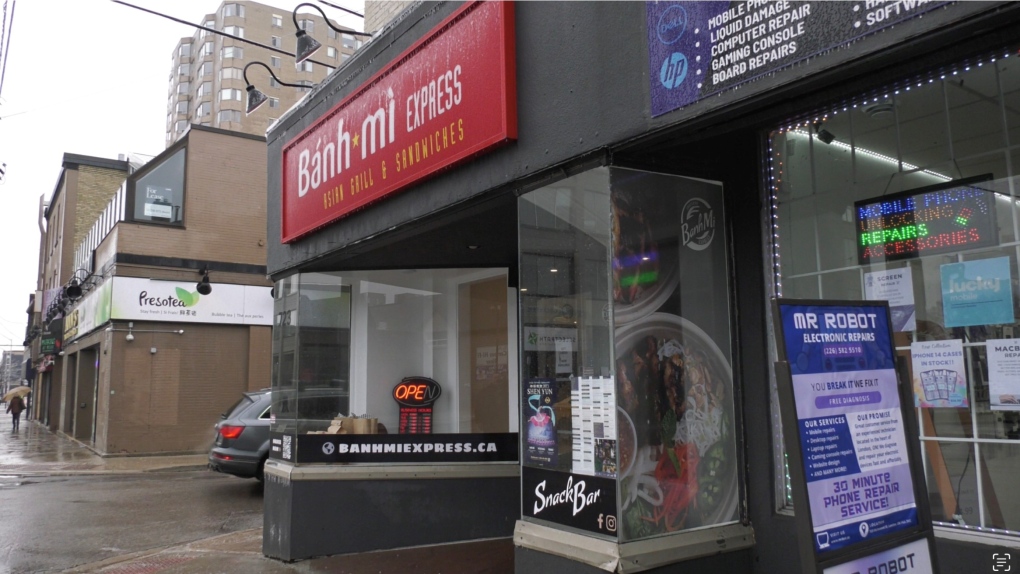Businesses prepare for the rollout of the province’s new naloxone program
Ontario businesses considered to be a "high-risk" setting will soon be required to have a naloxone kit on site but some feel the province could go further in the effort to prevent opioid deaths.
Labour Minister and Lambton Kent Middlesex MPP Monte McNaughton says the goal is to identify workplaces where drugs may be used and make sure naloxone kits are available to counteract the effects of an overdose.
"These businesses will be required to have life-saving naloxone kits and trained workers in the workplace,” McNaughton said.
Free naloxone kits and training will be available to high-risk small businesses for two years.
"Time is really of the essence when we're talking about these situations,” says Western University professor Steven Laviolette. His research delves into a number of aspects linked drug use, including impacts on brain function.
He sees a benefit to the targeted rollout of the naloxone kits.
"I think that a targeted approach makes the most sense, given limited resources and challenges with having enough staff on hand to act appropriately with the appropriate training,” Laviolette said.
The program is mandatory for businesses that have identified someone struggling with addictions and at risk of overdose. Bars and construction sites were cited as examples.
However, other small businesses say the also deal with addictions on an ongoing basis.
 Staff and management at Bahn Mi Express, an eatery along London's Richmond Row, say they often deal with individuals overdosing outside the restaurant and would welcome training for the use of naloxone kits pictured in London, Ont. on Thursday, Dec. 15, 2022. (Gerry Dewan/CTV News London)Staff and management at Bahn Mi Express say, since opening their Richmond Row eatery opened this time last year, they've seen a growing number of overdose emergencies at the their door step.
Staff and management at Bahn Mi Express, an eatery along London's Richmond Row, say they often deal with individuals overdosing outside the restaurant and would welcome training for the use of naloxone kits pictured in London, Ont. on Thursday, Dec. 15, 2022. (Gerry Dewan/CTV News London)Staff and management at Bahn Mi Express say, since opening their Richmond Row eatery opened this time last year, they've seen a growing number of overdose emergencies at the their door step.
"In the front, because it's covered, and in the back of the restaurant,” says spokesperson Shauna Versloot. “They've had to call EMS (emergency medical services) several times."
Versloot says management and staff want to be able to help those individuals.
“With a little bit of education and showing them how to work the kit, they all seemed very enthusiastic about helping others,” she said.
"I think it's a good thing, overall, to normalize that we intervene to protect people's lives,” says professor Jacob Shelley.
He is a member of Western University’s Faculty of Law, specializing in medical ethics and the law where it pertains to public health matters. He says the law generally falls on the side of those intervening during a medical emergency.
"As a general rule in Ontario we have the Good Samaritan Act which is legislation that protects people who intervene to act to help others. Unless somebody is grossly negligent they'd be protected from liability,” Shelley said.
Shelley points to the use of defibrillators, now common in public spaces, and administering EPI pens, for those experiencing allergic reactions, as examples where some would intervene to give medical assistance. He feels the naloxone policy could open a broader discussion about ways members of the public can act to assist others.
The government’s naloxone program goes into effect in June of next year.
CTVNews.ca Top Stories

Scurvy resurgence highlights issues of food insecurity in Canada's rural and remote areas
A disease often thought to only affect 18th century sailors is reemerging in Canada.
Lotto Max jackpot hits $80M for second time ever
The Lotto Max jackpot has climbed to $80 million for just the second time in Canadian lottery history.
Canada 'already past due' on NATO defence spending target: U.S. House intelligence committee chair Mike Turner
The chair of the United States House intelligence committee says Canada needs to accelerate its defence spending targets, especially with its military in 'desperate' need of investment.
Police thought this gnome looked out of place. Then they tested it for drugs
During a recent narcotics investigation, Dutch police said they found a garden gnome made of approximately two kilograms of MDMA.
Max Verstappen wins fourth straight World Championship as George Russell takes victory in Las Vegas
Max Verstappen claimed the Formula One World Drivers’ Championship at Las Vegas Grand Prix that saw George Russell take victory for Mercedes.
Nova Scotia Tories appear safe with close battle for second between Liberals and NDP
With two days left before Nova Scotians elect their next government, polls suggest Progressive Conservative Leader Tim Houston's decision to call an early vote will pay off and the real battle will be between the Liberals and NDP for second place.
Anti-NATO protest in Montreal continues as politicians denounce Friday's violence
Federal cabinet ministers condemned an anti-NATO protest in Montreal that turned violent on Friday, saying "hatred and antisemitism" were on display, but protesters deny the claim, saying they demonstrated against the "complicity" of NATO member countries in a war that has killed thousands of Palestinians.
Four convicted in Spain over homophobic murder that sparked nationwide protests
Four men were convicted on Sunday in connection with the homophobic murder of a 24-year-old nursing assistant that sparked nationwide protests.
School bullies have moved online. But is banning all under-16s from social media really the answer?
The Australian government introduced what it's called 'world-leading' legislation in parliament this week to wipe social media accounts – including Snapchat, TikTok, Facebook, Instagram, Reddit and X – from the devices of children under 16.


































